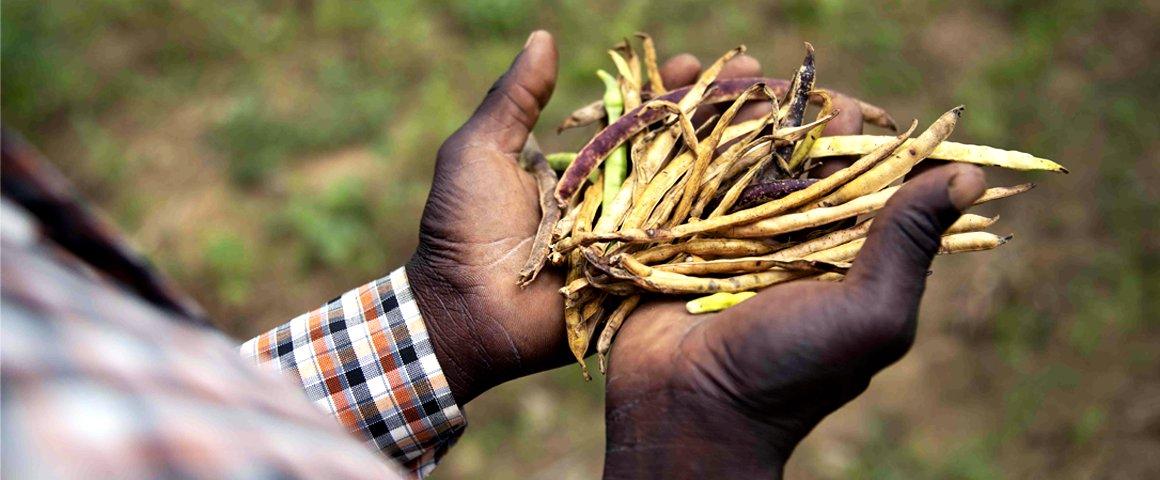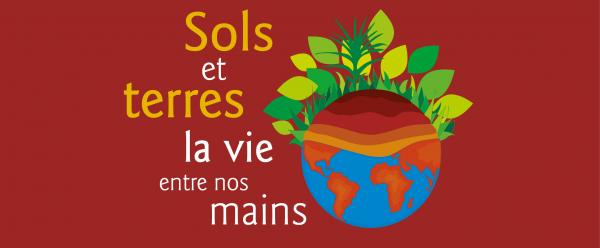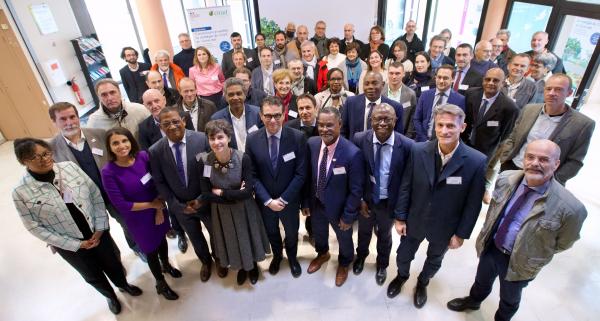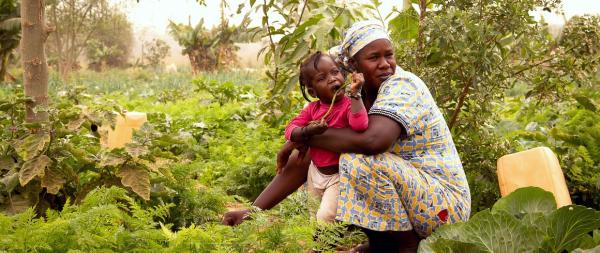Event 12 February 2024
- Home
- Press area
- Press releases
- Rencontres Francophones Légumineuses
Rencontres Francophones Légumineuses: innovation to promote plant protein

Freshly harvested cowpea in Burkina Faso. Once turned into flour or semolina, it can be used to make a wide range of food products © R. Belmin, CIRAD
Peas, beans, lentils, broad beans, fava beans, chickpeas, soybeans, cowpea and groundnut are just a few of the 20 000 species belonging to the huge legume family. A distinction can be made between dried pulses, which are used to make a wide range of emblematic dishes, fodder legumes - lucerne, sainfoin, lupin, trefoil, clover- and vetch in temperate climates - and others found across the tropics, such as pigeon pea, sword bean, tick-trefoil, and the family of trees and shrubs belonging to the genus Acacia.
Legumes naturally supply the soil with nitrogen, making them multi-service crops that can be grown either as intercrops or in association with cereals or with grasses in grasslands.
The fourth edition of this series of meetings, RFL4, is being organized for the first time in Africa. It will be looking at the entire range of legumes, whether suited to temperate or tropical climates: pulses, fodder legumes and also woody legumes, with a specific focus on tropical legumes as a way of boosting food security. Legumes have a major role to play in tackling the challenges posed by increased demand for protein as a result of strong population growth in Africa.
Legumes are a major agroecological lever for tackling global issues surrounding climate change and food security. They play a strategic role all over the world, in nutrition and protein and food sovereignty. The many legume species are also a great breeding ground for food innovations, and can be grown in a multitude of environments.
The RFL are also intended to facilitate discussions between the various players with a view to supporting innovation and the sustainable inclusion of legumes within farming systems and food value chains.
Scientists, start-ups, seed firms, collection organizations, industrialists, animal feed and human food operators, development and advisory services, and son on... almost 150 people are expected to be at the RFL, with as many again on line. This will be a unique opportunity to compare views, share knowledge and boost innovation in terms of legumes.
Legume production worldwide
Pulse production worldwide is dominated by Canada, the US, China, India and Southeast Asia. The European Union is the world leader in terms of pea and fava bean production. Production in Africa, for its part, is based on a range of species such as cowpea, various types of beans and peas, chickpeas and groundnut, which covers the widest area. Cowpeas and peas are often grown together with cereals (millet, sorghum or maize), making up the staple diet in many African countries.
Find out more: Terres Univia – Chiffres Clés 2022 (édition 2023) – Oléagineux et Plantes Riches en Protéines
Journalists will be able to follow the event on line, free of charge (questions may be asked via the chat only).
To request press accreditation: rfl4@alphavisa.com
A field visit is scheduled for participants, and possibly for journalists, to the CERAAS Thiès research centre, during the morning of Wednesday 24 January 2024. By registration only. Participants should meet at 7:15 am in Saly (Palm Beach Hotel) beforehand.
Information and registration: idiatou.diallo@cirad.fr - WhatsApp: +221 77 470 50 08
About
ISRA
L’Institut Sénégalais de Recherches Agricoles (ISRA) présente la spécificité de mener des recherches dans quatre domaines de production (végétales, animales, forestières, halieutiques) et sur la socio- économie, ce qui lui confère sa vocation agricole au sens large. L’institut intervient dans les six zones écogéographiques du Sénégal grâce à un dispositif infrastructurel dense constitué de centres régionaux, de laboratoires nationaux, d’unités de recherche et de production et de Points d’Appui de Prévulgarisation et d’Expérimentations Multilocales (PAPEM).
Terres Univia is the inter-branch organization of vegetal oils and proteins in France. Terres Univia is recognized as an inter-branch body by the French decree of 20 February 2015. The organization brings together the main trade associations and federations concerned by the production, collect, trade, transformation, and use of oilseed (rapeseed, sunflower, soy, flax, olive) and protein-rich plants (lentils, chickpeas, peas, field beans, lupin, alfalfa, beans).
Terres Inovia is the French technical institute for applied research and development of professionals in the vegetable oils and proteins sector and the hemp sector. Its mission is to improve the competitiveness of oilseeds, protein crops and industrial hemp, by adapting the production and valorization of products to the economic context and societal demands. Terres Inovia is part of the Acta network – Agricultural technical institutes.
INRAE, the French National Research Institute for Agriculture, Food, and Environment, is a major player globally in research and innovation. Gathering a community of 12,000 people with 272 units including fundamental and experimental research, spread out throughout 18 regional centres in France. Internationally, INRAE is among the top research organisations in agricultural and food sciences, plant and animal sciences, as well as in ecology and environmental science. It is the world’s leading research organisation specialising in agriculture, food and the environment. Faced with a growing world population, climate change, the depletion of resources and declining biodiversity, the Institute has a major role to play in providing the knowledge base supporting the necessary acceleration of agricultural, food and environmental transitions, to address the major global challenges.
CIRAD is the French agricultural research and international cooperation organization working for the sustainable development of tropical and Mediterranean regions. It works with its partners to build knowledge and solutions for resilient farming systems in a more sustainable, inclusive world. It mobilizes science, innovation and training in order to achieve the Sustainable Development Goals. Its expertise supports the entire range of stakeholders, from producers to public policymakers, to foster biodiversity protection, agroecological transitions, food system sustainability, health (of plants, animals and ecosystems), sustainable development of rural territories, and their resilience to climate change. CIRAD works in some fifty countries on every continent, thanks to the expertise of its 1700 staff members, including 1140 scientists, backed by a global network of some 200 partners. It also supports French scientific diplomacy operations. CIRAD conducts research on pulses in the countries of the global South, notably in Africa, across the entire value chain, from production (varietal breeding and agroecological crop management sequences) to consumption (agrifood processing tailored to the countries of the global South and nutrition to consumer expectations).
The Institut de recherche pour le développement (IRD) is a multidisciplinary French public research organization committed to equitable partnerships with countries in the Global South and in the French overseas territories for nearly 80 years. As a contributor to the achievement of the international development agenda, the IRD aligns its priorities with the implementation of the Sustainable Development Goals (SDGs). Together, scientists and the Institute’s partners propose concrete solutions to the global challenges facing societies and the planet. This win-win relationship makes science and innovation major levers for development.


























